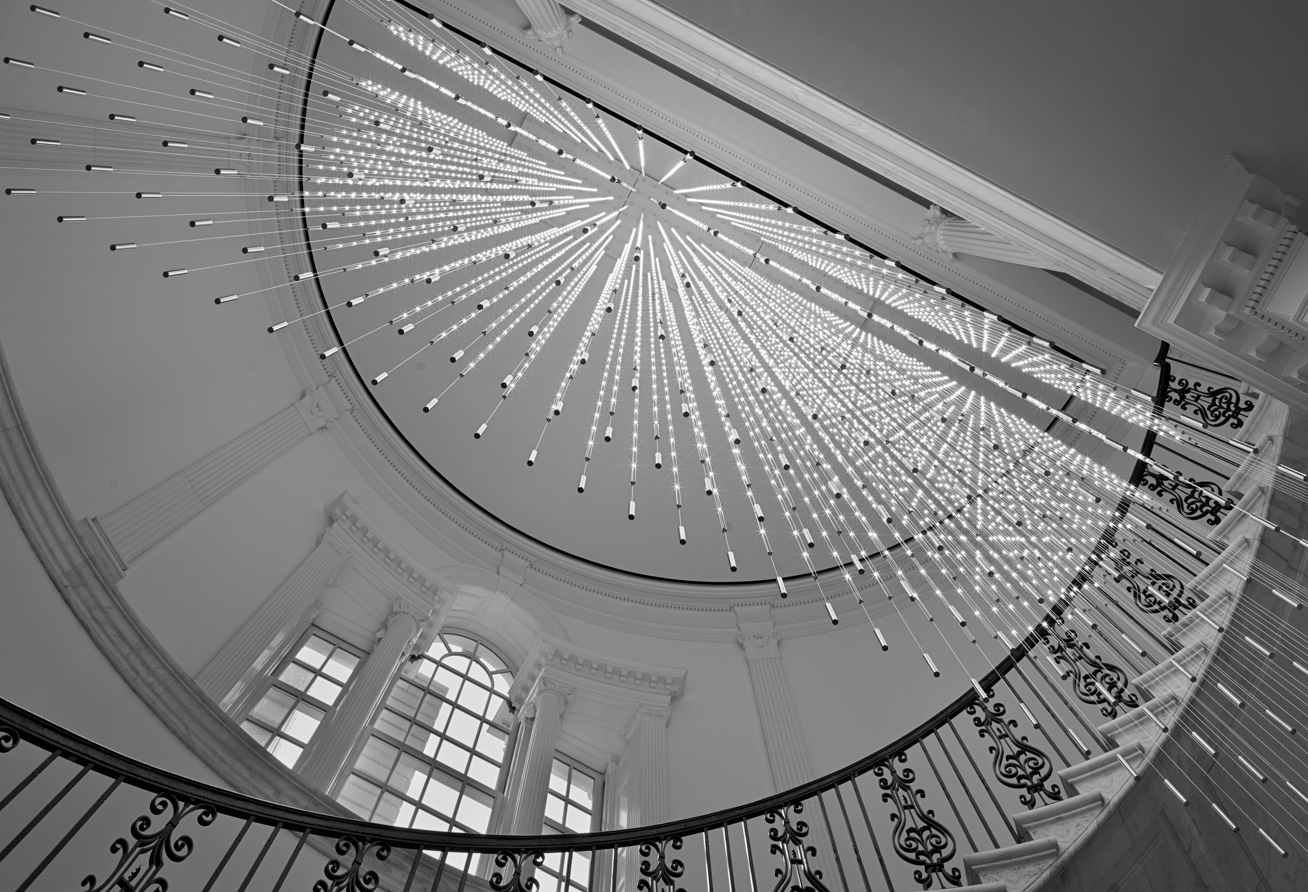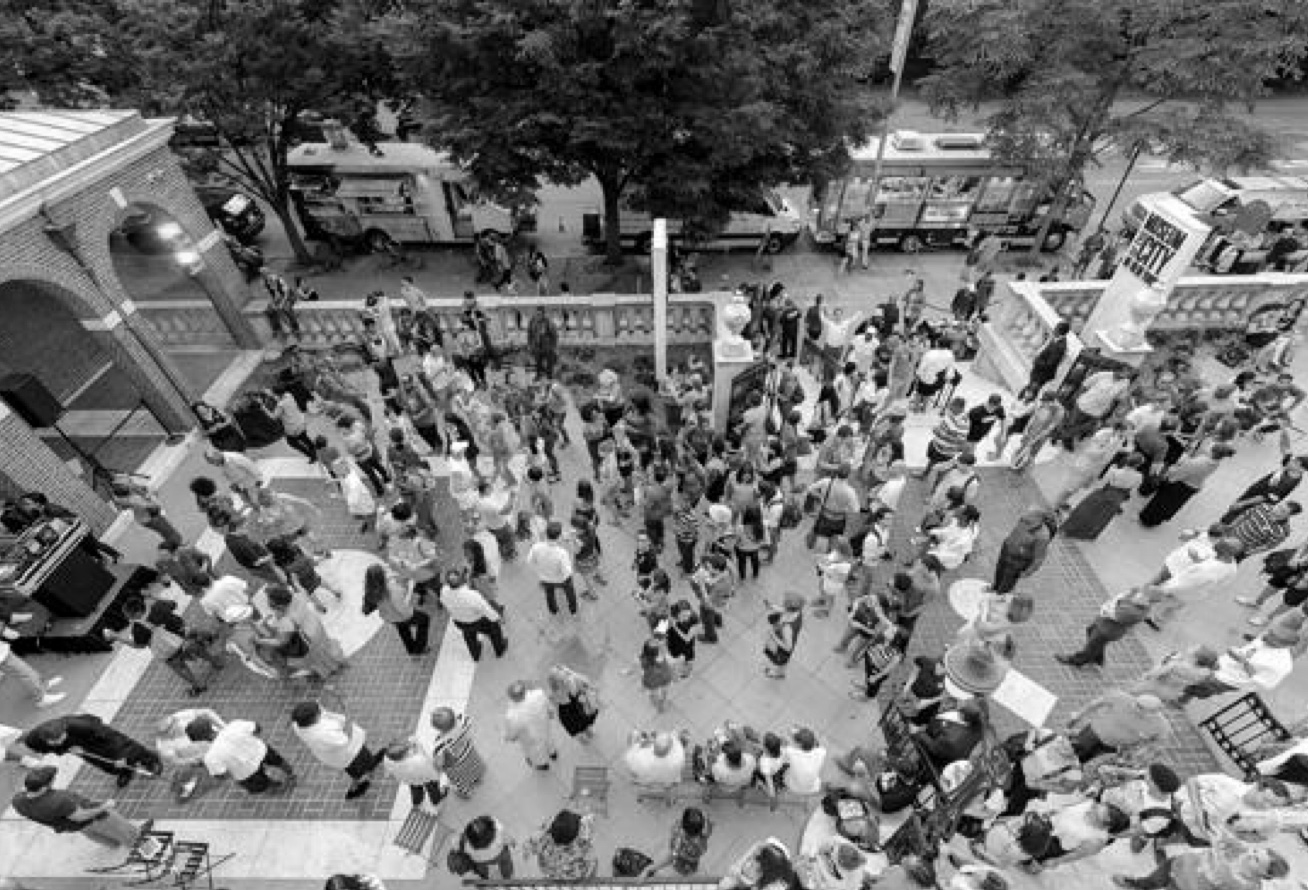Organizing Chinatown
Organizing and Chinese Exclusion in Chinatown
1933-1952
Ongoing

Back to Exhibitions
In the face of daunting barriers and widespread racism, in the 1930s Chinese American workers in Lower Manhattan’s Chinatown demanded improved labor rights, connected with groups in the global anti-imperialist movement, and resisted longstanding, legalized discrimination.
These movements were led by workers in hand laundries, which became the largest and most economically sustaining industry in the neighborhood in the era of Chinese Exclusion. The motto “the Laundry Alliance is for the laundrymen” captured the democratic vision of the Chinese Hand Laundry Alliance (CHLA).
Founded in 1933 to fight discrimination from City officials, the CHLA arose in urgent response to a bill by the City’s Board of Aldermen that imposed hefty increases in hand laundry licensing fees and citizenship requirements—which most residents were denied under Chinese Exclusion laws. After successfully lobbying to amend the bill, the CHLA grew to 3,200 members by the following year, nearly half of the Chinese laundry workers in New York. From its headquarters at 191 Canal Street, they provided mutual aid, legal services, and recreation.
The CHLA also remained engaged with events in China, largely supporting Chinese communists against Nationalist forces and threats from Japan, which led to intense scrutiny and decreased membership from the FBI by the 1950s. The organization, however, lasted into the 2000s.
With the recent rise in anti-Chinese discrimination and violence amidst the COVID-19 pandemic, histories of repression and resistance in New York’s first Chinatown remain as important as ever.
Meet the Activists
EUGENE MOY
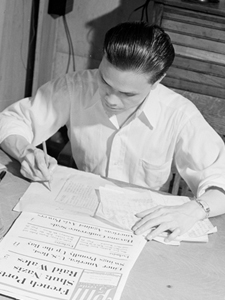
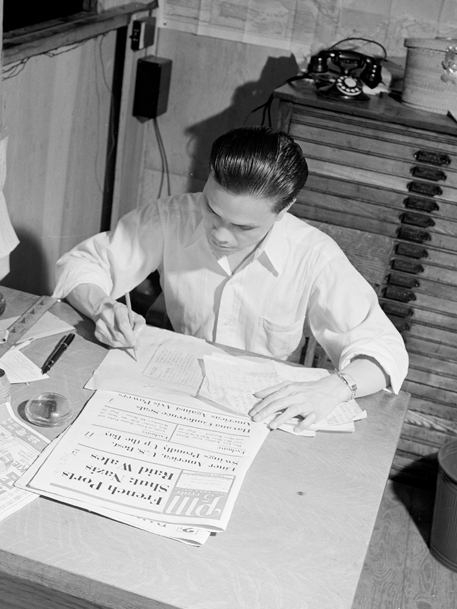
EUGENE MOY
EUGENE MOY TRANSLATING NEWSPAPER ARTICLES INTO CHINESE
Eugene Moy, editor-in-chief of China Daily News, played an important role in the political struggles of Chinatown in the 1940s. In March 1952, Moy, a US citizen, was prosecuted for violating the Trading with the Enemy Act. Moy and others affiliated with the newspaper and CHLA were found guilty for printing advertisements from the Bank of China and for sending money to relatives in China. Ultimately Moy, Chen Kangming, and Chen Youyun were all sentenced to time in jail. Moy reportedly died in jail; China Daily News remained in print.
Image Info: Alexander Alland, ca. 1940, Museum of the City of New York, 94.104.215
SUI WOO
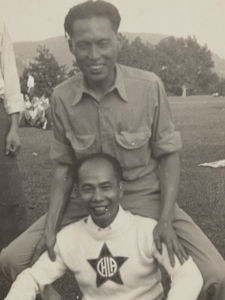
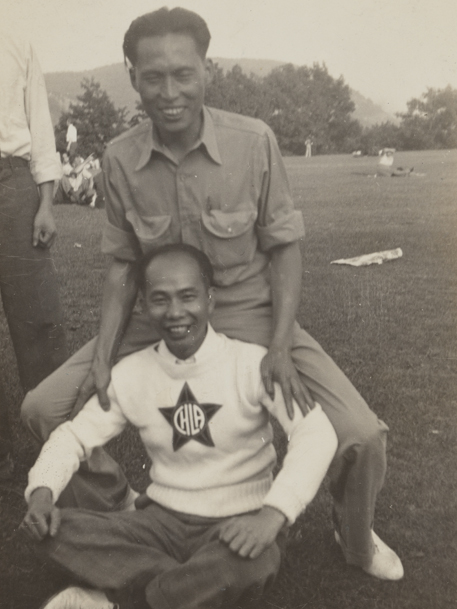
SUI WOO
SUI WOO AND A FRIEND AT BEAR MOUNTAIN
Sui Woo (bottom) emigrated from China to Chicago, where he worked as a waiter in the 1920s before opening a hand laundry in New York. One of the founding members of the CHLA, he remained active in the organization for decades.
Image Info: ca. 1930s-1940s, Courtesy of Betty Yu
Objects & Images
"The Chinese Question"
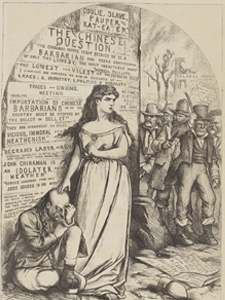
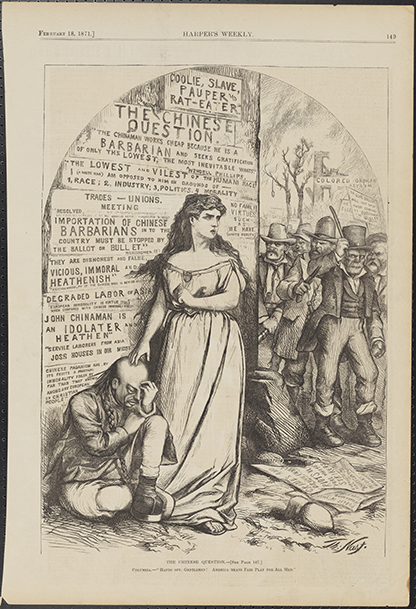
"The Chinese Question"
This political cartoon appeared at a time when mounting economic fears fueled the idea that Chinese immigrants were taking jobs from other New Yorkers. Using visual stereotypes, the image depicts a white female symbol of democracy protecting a helpless Chinese man in the face of an armed Irish mob. It accompanied an editorial denouncing William “Boss” Tweed’s bill prohibiting New York State from hiring Chinese workers. That bill failed, but in 1882 the federal Chinese Exclusion Act passed, prohibiting new immigration from China and denying citizenship to Chinese non-citizen immigrants already in the United States into the mid-20th century.
Image Info: Thomas Nast, Harper’s Weekly, 1871, Museum of the City of New York, 99.124.20
Chinese News
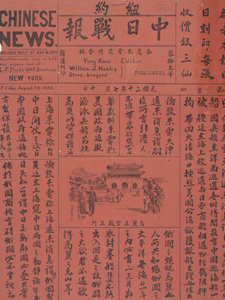
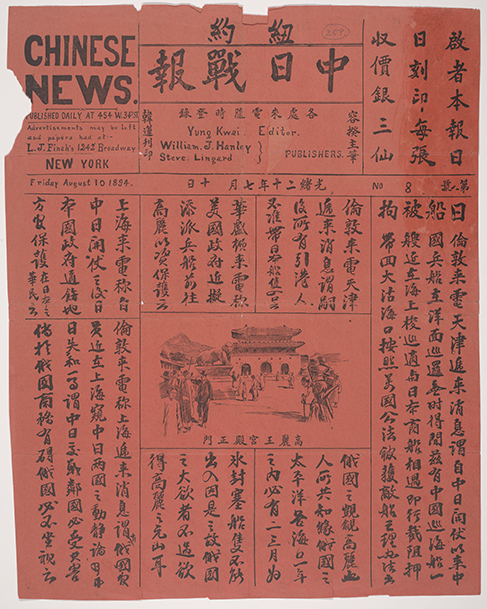
Chinese News
Laundry workers in New York City relied on local newspapers for news about both Chinatown and China. When several closed in the 1930s, they helped start the China Daily News (distinct from the earlier Chinese News, shown here) In the absence of many artifacts about laundry workers, historians have relied on these newspapers to learn their stories.
Image Info: August 10, 1894, Museum of the City of New York, 34.404.27
Henry Street Visiting Nurse Service, Rear Of Chinese Hand Laundry, Father Greeting Nurse On A Routine Visit To See His Child
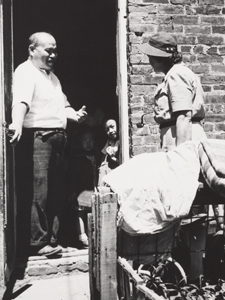
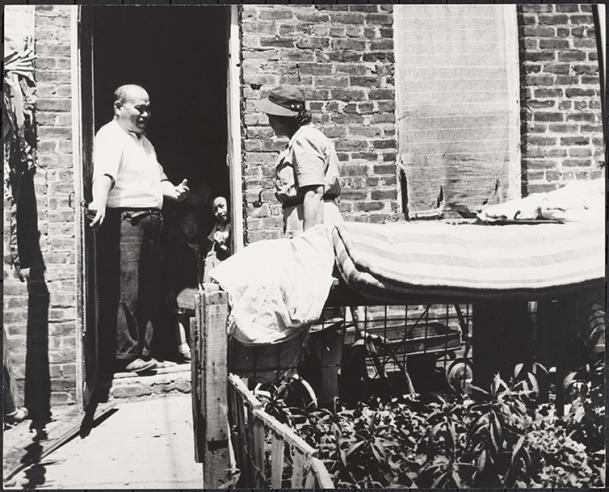
Henry Street Visiting Nurse Service, Rear Of Chinese Hand Laundry, Father Greeting Nurse On A Routine Visit To See His Child
While technically small businessmen, laundry workers considered themselves laborers, putting in physically demanding 15-hour days. Hand laundries were often owned and staffed by one or two people who worked in front and lived in back, which sometimes isolated laundry operators from resources and each other. In this photograph a nurse, part of the Visiting Nurse Service of New York, visits a man and his family at their laundry and residence. After Chinese Exclusion ended, women joined family members in running hand laundries in larger numbers.
Image Info: Roy Perry, ca. 1940, Museum of the City of New York, 80.102.2
Lung Chin's New York City Laundry License
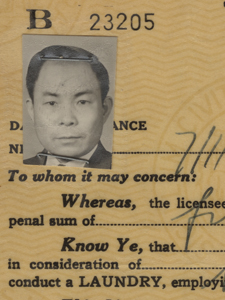
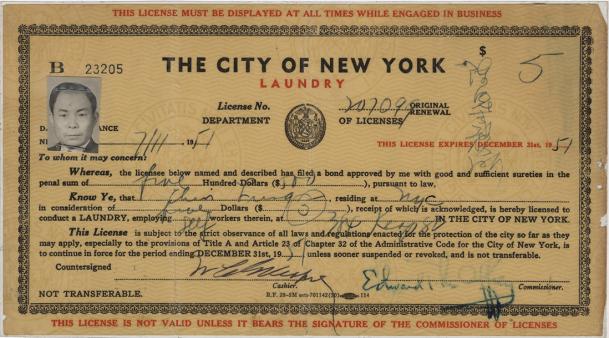
Lung Chin's New York City Laundry License
Immigrants from a range of professions in China came to the United States for economic opportunities. Yet once here, lynchings, “sundown clauses” restricting residence, legalized barriers to citizenship, and general anti-Chinese racism limited their job options. Requiring only a small monetary investment and little previous experience, by the 1870s hand laundries became a go-to career for generations of Chinese Americans. Yet Discriminatory licensing requirements specifically targeted Chinese laundries, prompting the formation of the Chinese Hand Laundry Alliance (CHLA).
Image Info: New York City Department of Licenses, 1951, Courtesy of Samantha Chin-Wolner, Museum of Chinese in America (MOCA) Collection
Chinese Hand Laundry Alliance Members At Bear Mountain
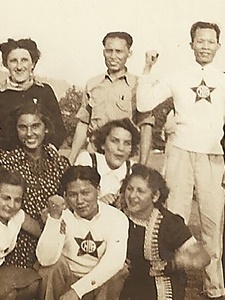
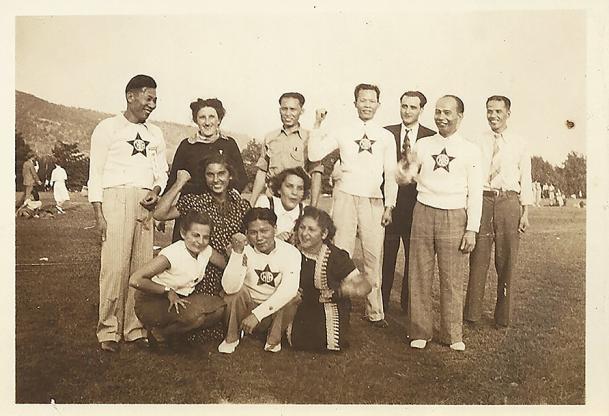
Chinese Hand Laundry Alliance Members At Bear Mountain
In April 1933, Lei Zhuofeng, Zhu Huagun, and 250 other Chinese New Yorkers sprang into action to form the Chinese Hand Laundry Alliance of New York (CHLA). This photograph shows founding member Sui Woo, second from right, and other members of the CHLA at Bear Mountain, north of New York City. The person in the suit next to Woo may be Julius Bezozo, lawyer for the CHLA and other progressive causes. Organized retreats, recreation, and picnics were common among groups at the time.
Image Info: ca. 1930s–1940s, Collection of Betty Yu
Chinese Hand Laundry Alliance Rally For China Relief
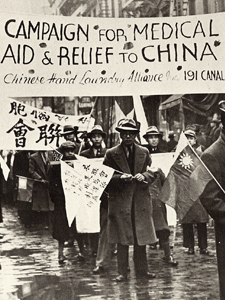
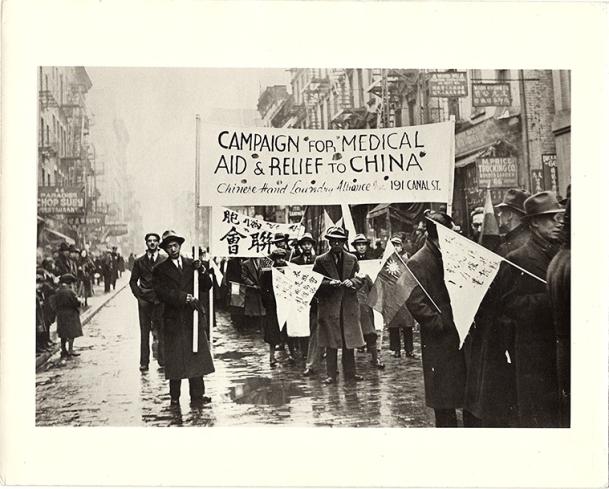
Chinese Hand Laundry Alliance Rally For China Relief
Chinese laundry workers connected their daily hardships to China’s status in the world, thinking that a stronger China would improve their treatment in the United States and create conditions for a possible return to their homeland. After the Japanese army occupied Manchuria in 1931, Chinese Americans expressed a united opposition from New York—even as leadership in China pursued a policy of non-resistance. Parades like this one, along with lobbying of US elected officials, also sought to raise awareness about the Japanese invasion of China among non-Chinese communities in New York.
Image Info: 1938, Museum of Chinese in America (MOCA) Chinese Hand Laundry Alliance Collection
Sign Notifying Customers Of Increased Prices
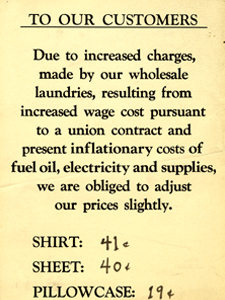
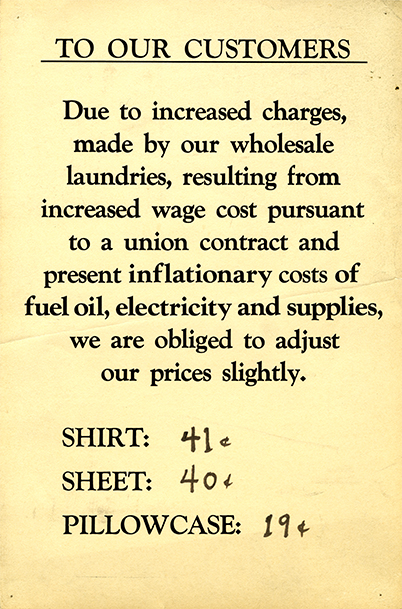
Sign Notifying Customers Of Increased Prices
Hand laundries worked with small profit margins. When Chinese-owned wet-wash factories raised the price for the washing hand laundries sent to them with little notice in 1946, Chinese hand laundries fought back. After failed attempts to negotiate, the CHLA opened its own factory, the Wah Kiu Wet-Wash Factory at 136 East Street in the Bronx. While the date of this sign is unknown, at the turn of the 20th century shirts were ten cents apiece.
Image Info: Maker and date unknown, Museum of Chinese in America (MOCA) Collection
Flyer, “Save General Fang Chih-min”
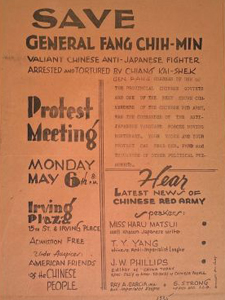
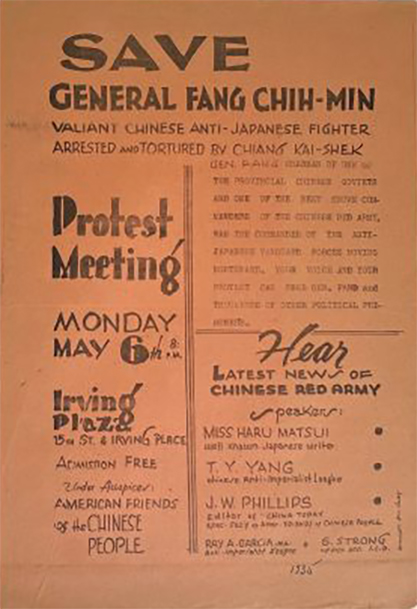
Flyer, “Save General Fang Chih-min”
Activists organized this rally in Manhattan’s Irving Plaza to protest the capture of Chinese Communist General Fang Chih-Min, who was ultimately executed by the Kuomintang (KMT) in the ongoing civil war between the KMT Nationalists and the Communists—who went on to declare victory and establish the People’s Republic of China in 1949. CHLA members who had supported the PRC subsequently experienced intense surveillance from the FBI. About 300 members remained in the group by the early 1950s, which increasingly espoused an uncritical support of the PRC, even as other members who returned to China were deeply disillusioned by what they saw.
Image Info: American Friends of the Chinese People, 1935
Key Events
| Global | Year | Local |
|---|---|---|
| 1882 | Chinese Exclusion Act takes effect nationwide, prohibiting immigration from China and denying paths to citizenship for most Chinese Americans in the United States; Chinese Consolidated Benevolent Associated (CCBA) founded in New York the following year. | |
| Civil war in China between Kuomintang (KMT) nationalists led by Chiang Kai-shek and Chinese Communist Party (CCP) led by Mao Zedong begins. | 1927 | |
| 1933 | Chinese Hand Laundry Alliance (CHLA) founded in New York City by laundry workers | |
| 1938 | CHLA members march in Manhattan to support China against Japanese invasion | |
| 1940 | China Daily News founded in New York, published until 1989 | |
| Chinese Exclusion technically ends when the US and China ally during World War II; quotas don’t change until 1965 | 1943 | |
| 1952 | CHLA members who support the People’s Republic of China (PRC) after communist victory in 1949 are targeted by the FBI and imprisoned under the Trading with the Enemy Act | |
| 1978 | Laundry worker and writer Tung Pok Chin publishes the memoir Paper Son, One Man’s Story; his wife Wing Fong Chin goes on to help lead the 1982 Chinatown garment worker’s strike |
